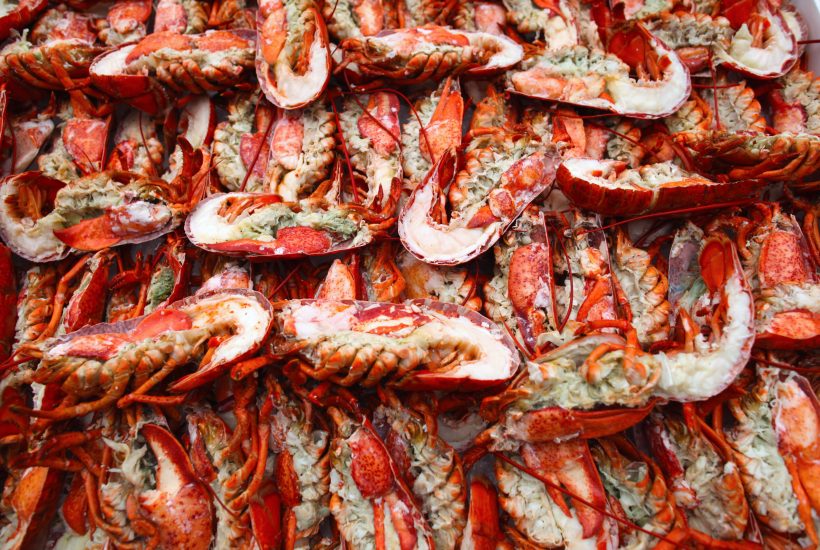Fishmongers are an endangered species in London. Thankfully, 15 minutes walk across Westminster from The Spectator’s offices there is an excellent fish stall on Tachbrook Street market in Pimlico. Jonathan Norris’s stall — much frequented by 1990s Tory politicians — does a thriving trade in live lobsters. He will happily boil the crustaceans for you in his lobster kettle, but buying them alive is more fun, especially if you have children in tow. At this time of year the lobsters are Cornish; in the winter live lobster flown in from Canada will have to do.
Buying — and then boiling — live lobsters is a sure way of getting children interested in their next meal, at least it is with my two boys. Seeing the crustaceans turning from dark blue to vibrant red and then the process of splitting the beast in half and cracking the shell offers more entertainment — the pleasures of lobster for adult and child alike are as much to do with the animal’s aesthetics as the actual taste of the flesh. Slaughtering lobsters is certainly a distraction from YouTube and other contemporary childhood pursuits. All this can be had for £20 or so from Mr Norris — surely a modest price for such a spectacle, not to speak of the childminding — although you can pay £50 or £60 for gargantuan specimens of the species.
The government is planning to prohibit this innocent pastime. It has indicated that it will support an amendment to the Animal Welfare (Sentience) Bill which will include cephalopods (squid, octopus, cuttlefish) and decapods (crabs, lobsters, crayfish, prawns) within its provisions. This will mean that boiling lobsters and crabs alive, the way in which they are overwhelmingly dispatched, will become illegal.
The law will also ban the sending of live lobsters and crabs through the post, the only way to get hold of them if one is not lucky enough to live by the sea or near Mr Norris’s stall or a similar purveyor. During the covid era, the mail ordering of live lobsters has boomed. The lockdown meant that restaurants, the principal domestic market for lobsters, were closed and exports were extremely difficult. The EU’s post Brexit shenanigans with shellfish — banning most British bivalves (oyster, mussels, scallops), or rather their necessary processing, on safety grounds when they were deemed perfectly safe before Brexit — do not directly affect lobsters, but the whole British seafood industry is deeply strained. Delivering lobsters directly to domestic consumers has proved a continuing lifeline, with firms like Lockdown Lobsters — founded by photographer Jude Edginton and Welsh lobster fisherman Sion Williams — springing up.
Lobsters and similar crustaceans have to be cooked alive or very swiftly after death, otherwise dangerous bacteria quickly develop. The methods for killing lobsters that will remain legal are either prohibitively expensive for the domestic cook — the equipment needed to kill lobster by the method favoured by the RSPCA, stunning them with an electric gun before boiling, costs around £2,500 — or very tricky to do for the untrained chef, swiftly splitting a live lobster in half by slicing it in two from its underside.
The justification for the proposed ban, that lobsters can experience pain, is disputed. And it will do nothing to improve the lot of most British lobsters. According to the Shellfish Association of Great Britain, 89 per cent of shellfish landed in the UK is exported, with the main markets being the EU and China — and they won’t be banning the practice any time soon.
Earlier this year the government made clear that it intends to ban the importation of foie gras; domestic production is already banned. This month it announced that it is also intending to ban the importation of shark fins. These attacks on posh foods will again do very little to improve animal welfare. The UK imports roughly 200 tons of foie gras per year, overwhelmingly from France and Hungary; France alone produces nearly 20,000 tons per year. A ban will probably do nothing as Chinese demand for European foie gras is inexorably rising. Foie gras, however, is a central part of the European gastronomic repertoire. Outlawing the stuff will undermine one of our great and most unexpected successes over the last 20 years: the emergence of London as the culinary capital of Europe. Fine dining without foie gras can survive, but it will be the poorer for it. The UK will be at risk of regaining its old reputation for gastronomic philistinism.
Campaigners have identified only 14 Chinese restaurants and a handful of shops that sell shark fin; its UK consumption is microscopic. Off their own back, chefs are finding adventurous ways to realistically recreate the viscosity of the soup; it is this sensation that diners are willing to pay extravagantly for as the fin has little flavour. Around the corner from Mr Norris’s stall is A. Wong — a two star Michelin restaurant, the only Chinese restaurant outside of Asia ever to achieve that accolade — which doesn’t have the dish on its menu. Their version is instead made with abalone and priced at £33, so it also fulfils the second requirement of the shark fin aficionado: the display of conspicuous consumption. Those who seriously want to save sharks should encourage chef Andrew Wong to export his approach to Hong Kong and China, where the demand is coming from.
These three proposed bans are solutions in search of a problem. They are an attempt to demonstrate that we can introduce more stringent animal welfare policies than we could when we were EU members. If the government wants to be serious about its newfound independence and make a real difference, it could instead amend the draconian EU regulations that have closed abattoirs and forced animals to be transported long distances for slaughter.
The bans do not tackle the real animal welfare issues created by our relentless quest for cheap food — but solutions to those issues would hit the wallets of the many. Instead, we have futile gesture politics that will make the lives of some of us less pleasurable, maybe in a modest way but in these times we need to find our pleasures where we can. It is something one would hope Boris Johnson, whose joie de vivre is central to his appeal, would understand.
Got something to add? Join the discussion and comment below.
Get 10 issues for just $10
Subscribe to The Spectator Australia today for the next 10 magazine issues, plus full online access, for just $10.




















Comments
Don't miss out
Join the conversation with other Spectator Australia readers. Subscribe to leave a comment.
SUBSCRIBEAlready a subscriber? Log in